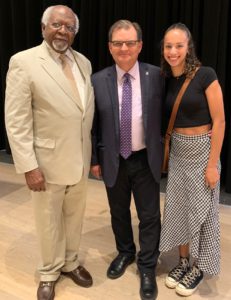On August 24th, one day after the International Day for the Remembrance of the Slave Trade and its Abolition, many gathered in Paul O’Regan Hall at the Halifax Central Library for an evening of moving music & spoken word, palpable unity, and a poignant presentation from Dr. Julius Garvey. This event hosting Dr. Garvey was sponsored by King’s and organized by the Universal Negro Improvement Association (UNIA), of which there are more than 600 branches worldwide. Djembe drumming and hearty conversation filled the hall before the event officially commenced, setting a rich tone for the coming hours.

Dr. Julius Garvey, President William Lahey and Sophia Wedderburn.
King’s President William Lahey made an introductory speech and spoke to the proactive role post-secondary institutions must take in acknowledging how they have benefitted from the slave trade, while combatting its systemic effects. Taking exemplary strides toward that proactive recognition, King’s will host the fall 2023 Universities Studying Slavery Conference in partnership with Dalhousie and the Black Cultural Centre for Nova Scotia. You can read more about the conference on this website.
Local soul-singer Eriana Willis-Smith then led a beautiful, collective singing of the Black national anthem, “Lift Every Voice and Sing.” Fifteen-year-old spoken word artist Damini Awoyiga sustained the powerful music of the evening and opened her compelling spoken word piece with the chorus of Bob Marley’s “Redemption Song.” To say Black excellence was in full effect would be an immense understatement.
The evening’s keynote speaker, Dr. Julius Garvey, is both highly achieved in the medical realm as a cardiothoracic & vascular surgeon and an incredibly staunch advocate for the Black community. His uplifting and unique insights captivated the audience.
Outspoken in his advocacy, Dr. Garvey’s passion to enact change and improvement for the Black community amply emulates his father, Marcus Garvey. UNIA founder and a cornerstone in the rise of Black Nationalism and Pan Africanism, Marcus Garvey looked to improve the oppressed conditions of Black people on an international scale. He founded and organized the first global Black Nationalist organization called the UNIA, in an effort to reach full emancipation for Black people through the robust vehicles of education and economic independence. He inspired human rights activists such as Martin Luther King Jr. and Malcolm X and worked alongside many like-minded trailblazers in Black history such as Madam C.J. Walker.
Dr. Garvey reflected on his father’s legacy and spoke to the colonial conditions that inundated much of the world during his father’s endeavours to equip Black people with the voice, resources and opportunities to succeed that they were constantly denied. Drawing on his father’s resilience, Dr. Garvey highlighted the conditions that we must create and cultivate to overcome the deep-seated colonization that has systemically manifested through centuries. He spoke in detail on “emancipation from mental slavery,” a concept from a speech delivered by his father here in Nova Scotia in 1937. That speech is widely known to have inspired Bob Marley’s “Redemption Song.”
Delving deeper, Dr. Garvey positioned mental slavery as imposed by capitalism and scientific materialism, which tie meaning purely to the material. Although science and medicine play a pivotal role in Dr. Garvey’s career and life, he seamlessly integrated the spiritual into his conversation on the journey towards decolonization. Dr. Garvey’s position pointedly focused on the idea that the human condition cannot be defined solely by the five tangible senses; there is an intangible spirit within that must be freed in order to fully emancipate oneself from mental slavery. It’s this intangible spirit that has been vital to the strength and perseverance of the Black community through years of harrowing adversity. Dr. Garvey asserts that connecting with this intangible spirit is key for racial healing and redemption.
During the question period, Dr. Garvey was asked how this individual spirit can celebrate diversity while being a driver of change. He answered that when we free ourselves from the oppressive mechanisms within capitalism and materialism, we are each aligned with a broader spiritual unity that has the power to create social change.
The evening wrapped up on a personal note when I had the opportunity to be introduced to Dr. Garvey after his speech. While he shared stories of his time at McGill with me, I discovered that Dr. Garvey knew my grandfather, Gus Wedderburn, during his time studying there. This was a special moment to end an event built around strong intergenerational connections.
Bob Marley’s Garvey-inspired “Redemption Song” could be felt throughout the entire evening and left this writer replaying: “Won’t you help to sing these songs of freedom? Cause all I ever have, Redemption Songs, Redemption Songs, Redemption Songs.”

